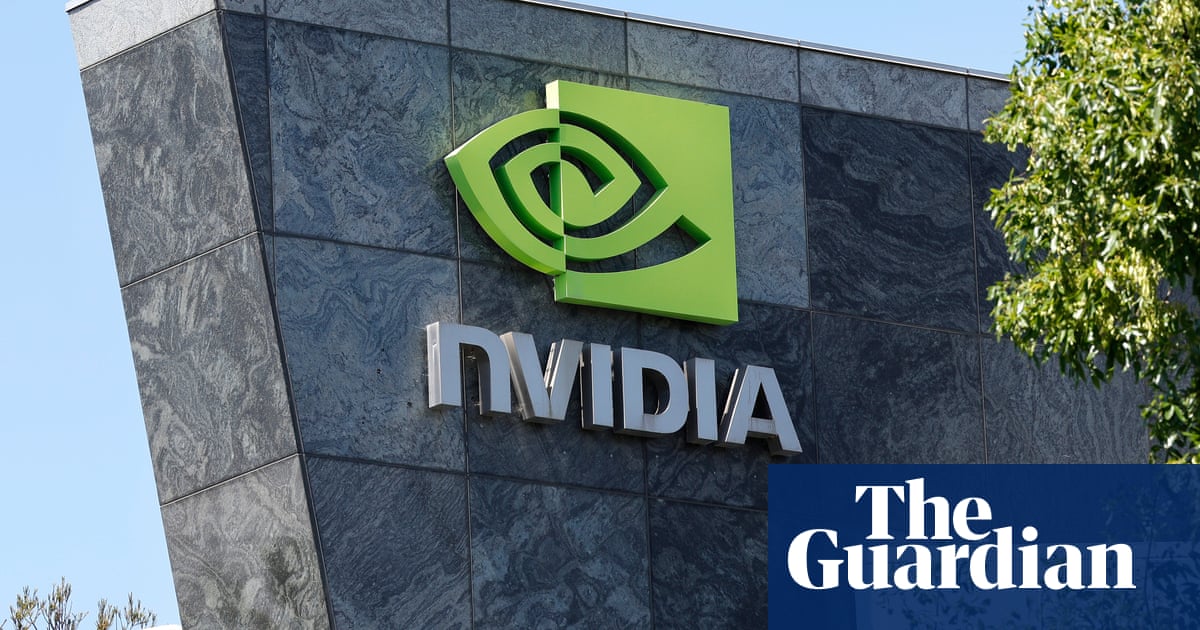Nvidia beat Wall Street’s expectations in its quarterly earnings report Wednesday, marking another in a string of financial wins for the computer hardware giant. It reported $44.1bn in revenue in the quarter ending in April, up 69% from the previous year.
The company exceeded investors’ predictions of $43.3bn in revenue . Adjusted earnings per share came in at $0.81, under investor expectations of an adjusted earnings per share of 88 cents. The company also reported $39.1bn in data center revenue, up 73% from the year prior.
The company is a bellwether for the business of artificial intelligence, both in its cutting-edge hardware and the new regulatory headwinds it is facing, and investors are watching closely.
“Nvidia beat expectations again but in a market where maintaining this dominance is becoming more challenging,” emarketer analyst Jacob Bourne said. The China export restrictions underscore the immediate pressure from geopolitical headwinds, but Nvidia also faces mounting competitive pressure as rivals like AMD gain ground on cost-effectiveness metrics for certain AI workloads.”
There’s no company more important to “the markets and global investor sentiment” than the high-flying chipmaker, according to Wedbush Securities analysts.
“Global demand for Nvidia’s AI infrastructure is incredibly strong,” Wedbush analysts wrote. “Countries around the world are recognizing AI as essential infrastructure – just like electricity and the internet – and Nvidia stands at the center of this profound transformation.”
The chipmaker said it expects to see $45bn in the second quarter of fiscal year 2026.
Nvidia’s quarterly reports for the past year have shown explosive growth. The company faces increasing pressure from the US. Donald Trump’s April announcement that the administration was tightening export rules on computer chips effectively banned Nvidia from selling its H20 AI chips to China, a major source of revenue. “H20 products were designed primarily for the China market,” the company’s first quarter earnings report reads.
The companyrevealedin a recent SEC filing that the change would cost the company $5.5bn in charges. The company said it saw just $4.6bn in charges “associated with H20 excess inventory and purchase obligations as the demand for H20 diminished” in the first quarter. In aninterviewwith Ben Thompson, the Nvidia CEO Jensen Huang said the move was “deeply painful” and couldresult in $15 bn in revenue loss.In just the first quarter, the company was also “unable to ship an additional $2.5bn of H20 revenue.”
Sign up toTechScape
A weekly dive in to how technology is shaping our lives
after newsletter promotion
“No company in history has ever written off that much inventory,” Huang said. “[N]ot only am I losing $5.5bn – we wrote off $5.5bn – we walked away from $15bn of sales and probably ... $3bn worth of taxes.”
The tightening rules on chip exports comes as thecommitteeon China within the US Congress announced it was seeking answers from Nvidia about how its chips ended up powering breakthrough AI models in China, particularly DeepSeek, an AI company that matched the products of US AI companies without the same computing power. The committee alleges in a new report that China-based DeepSeek “covertly funnels American user data to the Chinese Communist party, manipulates information to align with CCP propaganda, and was trained using material unlawfully obtained from U.S”.
Analysts are bracing for what this could mean for the next few quarters.
“Next year will be interesting since there is uncertainty from the geopolitics (ie export controls, tariffs, negotiations), despite strong demand for its data center products (Hopper and Blackwell chips),” said Alvin Nguyen, a senior analyst at Forrester.
While in previous quarters, analysts were looking to see how much the company would surpass investor expectations this quarter the considerations are more tame, according to a Wedbush Securities analyst’s note.
“This quarter its more about strong numbers and the ability to maintain guidance despite the China blockade,” the note reads. “Investors are more laser focused on the medium term and long-term outlook from Jensen as the China situation could quickly change depending on the ongoing US/China trade negotiations.”
While the company’s business in China remains up in the air, analysts seem heartened by recent demand for Nvidia chips in Saudi Arabia and the UAE. Nvidia was among the beneficiaries of the AI windfall that arose from Trump’svisitto the region, which resulted in Saudi Arabia committing to $600bn to US companies. Nvidia said it will sell hundreds of thousands of AI chips to Saudi Arabia, including 18,000 of its latest chip, Blackwell, to a Saudi Arabian sovereign wealth-fund backed startup called Humain.
